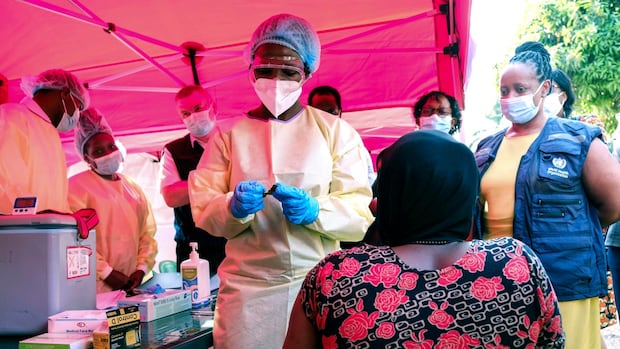Ebola vaccine trial begins in Uganda amid outbreak

Ugandan authorities have initiated a clinical trial for a vaccine targeting the Sudan strain of Ebola, following the death of a 32-year-old male nurse in Kampala. The nurse, who passed away last Wednesday, was confirmed to have been infected with the Sudan strain of Ebola through postmortem tests, as stated by Diana Atwine, the permanent secretary of the health ministry.
The clinical trial for the vaccine is currently enrolling health workers and individuals who have been exposed to the virus. The outbreak of Ebola was officially declared on Jan. 30 in Uganda, with the total number of cases now reaching three, including the deceased nurse and two additional cases from his family. Emmanuel Ainebyoona, the Ministry of Health spokesperson, mentioned that authorities are actively investigating the source of the outbreak.
Collaborating with Uganda’s Ministry of Health, the Uganda Virus Research Institute, and the Makerere University Lung Institute, the World Health Organization has initiated the trial of the vaccine. Developed by Merck and provided by the International AIDS Vaccine Initiative, the vaccine aims to combat the Sudan strain of Ebola that has surfaced in Uganda.
The Sudan strain of Ebola presents symptoms such as hemorrhage, headache, and muscle pains, similar to other strains within the Ebola viral family. The virus is typically transmitted through contact with bodily fluids of infected individuals or contaminated materials. Uganda has previously encountered five Ebola outbreaks, with one in 2000 resulting in numerous fatalities.
Although the Sudan strain of Ebola is comparable to the more widely known Zaire strain in terms of symptoms and severity, it lacks an approved vaccine and advanced therapeutics. Gary Kobinger, a former researcher at Canada’s National Microbiology Laboratory, emphasized the urgency of developing effective treatments for the Sudan strain.
In response to the outbreak, health workers and potentially exposed individuals are being offered doses of the candidate vaccine provided by the International AIDS Vaccine Initiative. The mobility of Kampala’s population poses challenges for contact tracing efforts, which are crucial for containing the spread of the virus.
The swift deployment of the vaccine candidate in Uganda highlights the country’s preparedness in response to the outbreak. The clinical trial aims to evaluate the vaccine’s efficacy in combatting the Sudan strain of Ebola. This proactive approach contrasts with previous outbreaks, where vaccine trials were not ready to be conducted in time.
As the first Ebola outbreak since the U.S. administration’s decision to withdraw from the World Health Organization, the importance of a well-funded and functional WHO in addressing global health crises is underscored. Dr. Isaac Bogoch, an infectious diseases specialist, emphasized the significance of swift and appropriate action in containing emerging infectious diseases to prevent regional and global implications.
In conclusion, the collaborative efforts in Uganda to conduct a clinical trial for the Ebola vaccine reflect a proactive response to the current outbreak. With ongoing investigations into the outbreak’s source and the evaluation of the vaccine’s efficacy, authorities are working diligently to mitigate the spread of the Sudan strain of Ebola in the region.




